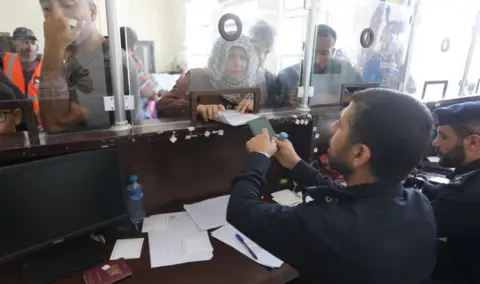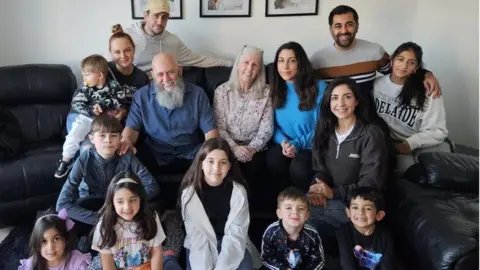Rafah crossing: More than 100 Britons leave Gaza but dozens remain
 Getty Images
Getty ImagesMore than 100 British people have left Gaza this week - and it is hoped more will be evacuated on Sunday, the deputy prime minister has told the BBC.
Oliver Dowden told Laura Kuenssberg it was "disappointing" the Rafah crossing was closed on Saturday.
He said the government was "engaging closely" with authorities there and hoped it would reopen soon.
The Rafah crossing was opened for three days earlier this week, with dozens of Britons named as eligible to leave.
The Palestinian border authority has been issuing lists of those who can present themselves at the crossing with their passports. Friday's list named more than 90 British citizens, with 88 on Saturday's list.
Before Mr Dowden's comments, it was not clear how many had actually managed to leave.
As well as some foreign passport holders and their dependents, some wounded Palestinians were also allowed to leave Gaza via the border crossing and enter Egypt.
But on Saturday, hundreds with foreign passports went to the border but were not allowed to cross.
Sources from the crossing authorities on the Palestinian side told the BBC that movement of people with foreign passports was not being allowed until there was agreement on the safety of transferring injured patients.
There has been no official statement from the authorities as yet.
It was thought there were around 200 British nationals in Gaza before war broke out.
Mr Dowden said: "The first thing we are doing is trying to make sure we get the Rafah crossing open again and I'm hopeful we will make progress on that today.
"Secondly, we are seeking to have these temporary pauses to allow humanitarian aid in and to get our people out."
Among Britons who have left are the in-laws of Scotland's First Minister Humza Yousaf.
Elizabeth and Maged El-Nakla - the parents of Mr Yousaf's wife Nadia, were allowed to leave Gaza via the Rafah crossing on Friday. They had been trapped there after war broke out while they were visiting their son and grandchildren.
Mr Yousaf, writing on X, said there were mixed feelings.
"We are of course elated, but my father-in-law said 'My heart is broken in two, with my mum, son and grandchildren in Gaza'. He then broke down telling me how hard it was saying goodbye to them."
Mr Dowden urged Britons remaining in Gaza to contact the Foreign Office.
The Foreign Office said: "This continues to be a complex and challenging situation and we are using all diplomatic channels to press for its reopening in coordination with our international partners.
"We remain in contact with British nationals in the region to provide them with the latest information."
 Humza Yousaf
Humza YousafBorder crossings in and out of Gaza have been closed since 7 October, when Hamas, which is a proscribed terrorist organisation in the UK, attacked Israel, killing more than 1,400 people and taking more than 240 hostage.
Since then, the Israeli military has launched a massive bombing campaign on Gaza, placed the strip under a "complete siege" and recently launched a ground assault on the north of Gaza. The Hamas-run health ministry in Gaza says more than 9,400 people have been killed.
It is thought 14 Britons died in the 7 October attack by Hamas on Israel. Mr Dowden said three Britons remained unaccounted for, but he was unable to say whether or not they had been taken hostage.

More on Israel-Gaza war
- Follow live: Latest updates
- Analysis: Jeremy Bowen's five new realities after four weeks of war
- From Gaza: Stories of those killed in Gaza
- Watch: Breaking down videos from Gaza's secret tunnels
- Explained: Ros Atkins on... Calls for a ceasefire in Gaza
- History behind the story: The Israel-Palestinian conflict

Abdelkader Hammad, a British transplant surgeon who lives in Liverpool, left through the Rafah crossing on Thursday after being trapped for weeks.
He told BBC Breakfast: "It was a terrifying experience really with all the explosions around us and the shrapnel and the concrete coming down, the glass broke, and the ceiling coming down [...] but this is the picture in Gaza.
"In fact, we were the lucky ones there because we are protected by the UN. But for other people, there isn't shelter."
Dr Hammad added: "And I can smell, the smell of death really, because there are still a lot of bodies under the rubble."
He later told BBC Radio 5 live: "I can't stop thinking about my colleagues who I left there and the patients I usually treat in Gaza.
"I think many of them [kidney patients] will die to due to lack of treatment during this period."
Many of those trapped in Gaza and seeking to leave have family in the UK urgently watching the situation.
Faras Abuwarda's wife and five children - aged between three and 11 - have been named on a list of those allowed to leave but they are stuck in the north and cannot get to Rafah.
Mr Abuwarda, who travelled with his family to see relatives but then returned to London for work, said: "The situation is a disaster. We are disgusted at the British government as they aren't able to help us.
"What we ask for is safe travel to the border, nothing else, and we're unable to get it."
He is waiting in Cairo, Egypt, and says his children are "frustrated, hopeless, and feel isolated".
Omar Mofeed, from London, said his brother and pregnant wife, along with their three children, also do not believe it is safe to travel through Gaza.
"The British foreign ministry called us saying Israel has allowed a safe route [...] then people start going, and Israel attacked people who are walking on this safe route," he said.
The Israeli military has said it does not target civilians.
Icel Chumlukh said his wife Lamia, his 13-year-old stepdaughter and the couple's one-year-old son had turned up at the border but were asked to leave.
While his wife and son are on the list, his step-daughter is not - but his wife took her anyway, "hoping for a miracle".
He said his son now "screams every time he hears a bang, or when someone closes a door" because they remind him of the sound of airstrikes.

Have you been affected by the issues raised in this story? Email [email protected].
Please include a contact number if you are willing to speak to a BBC journalist. You can also get in touch in the following ways:
- WhatsApp: +44 7756 165803
- Tweet: @BBC_HaveYourSay
- Upload pictures or video
- Please read our terms & conditions and privacy policy
If you are reading this page and can't see the form you will need to visit the mobile version of the BBC website to submit your question or comment or you can email us at [email protected]. Please include your name, age and location with any submission.
